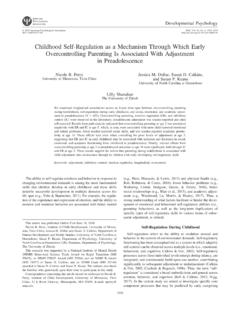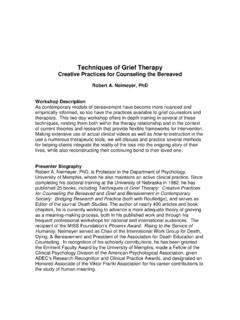Transcription of The Benefits of Playing Video Games
1 The Benefits of Playing Video GamesIsabela Granic, Adam Lobel, and Rutger C. M. E. EngelsRadboud University NijmegenVideo Games are a ubiquitous part of almost all children sand adolescents lives, with 97% Playing for at least onehour per day in the United States. The vast majority ofresearch by psychologists on the effects of gaming hasbeen on its negative impact: the potential harm related toviolence, addiction, and depression. We recognize thevalue of that research; however, we argue that a morebalanced perspective is needed, one that considers not onlythe possible negative effects but also the Benefits of playingthese Games .
2 Considering these potential Benefits is impor-tant, in part, because the nature of these Games haschanged dramatically in the last decade, becoming in-creasingly complex, diverse, realistic, and social in small but significant body of research has begun toemerge, mostly in the last five years, documenting thesebenefits. In this article, we summarize the research on thepositive effects of Playing Video Games , focusing on fourmain domains: cognitive, motivational, emotional, and so-cial. By integrating insights from developmental, positive,and social psychology, as well as media psychology, wepropose some candidate mechanisms by which playingvideo Games may foster real-world psychosocial aim is to provide strong enough evidence and a the-oretical rationale to inspire new programs of research onthe largely unexplored mental health Benefits of , we end with a call to intervention researchers andpractitioners to test the positive uses of Video Games , andwe suggest several promising directions for doing.
3 Video Games , mental health, adolescents, social,motivationThe game of Chess is not merely an idle amusement. Several veryvaluable qualities of the mind, useful in the course of human life,are to be acquired or strengthened by it, so as to become habits,ready on all occasions .. we learn by Chess the habit of not beingdiscouraged by present bad appearances in the state of our affairs,the habit of hoping for a favourable change, and that of persever-ing in the search of resources. Benjamin Franklin, The Morals of Chess Today, in the United States, 91% of children betweenthe ages of 2 and 17 play Video Games (NPD Group,2011), and a nationally representative study of found that up to 99% of boys and 94% of girlsplay these Games (Lenhart et al.)
4 , 2008). In the United Statesalone, Video Games brought in over $25 billion in 2010,more than doubling Hollywood s 2010 box office sales of$ billion in the United States and Canada (MotionPicture Association of America, 2011). Against this back-drop of nearly ubiquitous play, the popular press regularlypulses out urgent warnings against the perils of addiction tothese Games and their inevitable link to violence and ag-gression, especially in children and adolescents. Indeed, thevast majority of psychological research on the effects of gaming has been focused on its negative impact: thepotential harm related to aggression, addiction, and depres-sion ( , Anderson et al.
5 , 2010; Ferguson, 2013; Lemolaet al., 2011). It is likely that this focus will not diminish inthe near future, in part because of the enormous mediaattention garnered when mass killings ( , the ColumbineHigh School slayings in 1999) are associated with youthwho play violent Video Games (Ferguson, 2007). Mostrecently (December 2012), the revelation that the SandyHook Elementary School gunman played shooter gamesdirectly resulted in President Obama requesting Congressto allocate $10 million for research on the effects of violentmedia, especially Video Games (Obama & Biden, 2013).
6 Decades of valuable research on the effects of violentvideo Games on children s and adolescents aggressivebehavior already exists, and this is indeed an importantbody of work to consider. However, we argue that in orderto understand the impact of Video Games on children s andadolescents development, a more balanced perspective isneeded, one that considers not only the possible negativeeffects but also the Benefits of Playing these Games . Con-sidering these potential Benefits is important, in part, be-cause the nature of these Games has changed dramaticallyin the last decade, becoming increasingly complex, diverse,realistic and social in nature (Ferguson & Olson, 2013).
7 Asmall but significant body of research has begun to emerge,mostly in the last five years, documenting these propose that, taken together, these findings suggest thatvideo Games provide youth with immersive and compellingsocial, cognitive, and emotional experiences. Further, theseexperiences may have the potential to enhance mentalhealth and well -being in children and this article, we summarize the research on thebenefits of Playing Video Games , focusing on four maindomains: cognitive ( , attention), motivational ( , re-silience in the face of failure), emotional ( , mood man-agement), and social ( , prosocial behavior) Benefits .
8 ByThis article was published Online First December 2, Granic, Adam Lobel, and Rutger C. M. E. Engels, DevelopmentalPsychopathology Department, Behavioural Science Institute, RadboudUniversity Nijmegen, Nijmegen, The concerning this article should be addressed to Isa-bela Granic, Developmental Psychopathology Department, BehaviouralScience Institute, Radboud University Nijmegen, Montessorilaan 3, 6525HR Nijmegen, The Netherlands. E-mail: 2014 American Psychologist 2013 American Psychological Association 0003-066X/14/$ 69, No. 1, 66 78 DOI: insights from developmental, positive, and so-cial psychology, as well as media psychology, we proposesome candidate mechanisms by which Playing Video gamesfosters real-world Benefits .
9 Our hope is to provide strongenough evidence and a theoretical rationale to inspire newprograms of research on the largely unexplored mentalhealth Benefits of gaming. Finally, we end with a call tointervention and prevention researchers to test the potentialpositive uses of Video Games , and we suggest severalpromising directions for doing Function of PlayAlthough relatively little research has focused on the ben-efits of Playing Video Games specifically, the functions andbenefits of play more generally have been studied fordecades. Evolutionary psychology has long emphasized theadaptive functions of play (for a review, see Bjorklund &Pellegrini, 2010), and in developmental psychology, thepositive function of play has been a running theme forsome of the most respected scholars in the field ( ,Erikson, 1977; Piaget, 1962; Vygotsky, 1978).
10 Erikson(1977) proposed that play contexts allow children to ex-periment with social experiences and simulate alternativeemotional consequences, which can then bring about feel-ings of resolution outside the play context. Similarly, Pi-aget (1962) theorized that make-believe play provides chil-dren opportunities to reproduce real-life conflicts, to workout ideal resolutions for their own pleasure, and to amelio-rate negative feelings. Both Piaget (1962) and Vygotsky(1978) espoused strong theoretical links between play anda variety of elements that foster the development of social cognition, developmentalists have em-phasized that play constitutes an emotionally significantcontext through which themes of power and dominance,aggression, nurturance, anxiety, pain, loss, growth, and joycan be enacted productively ( , Gottman, 1986).













